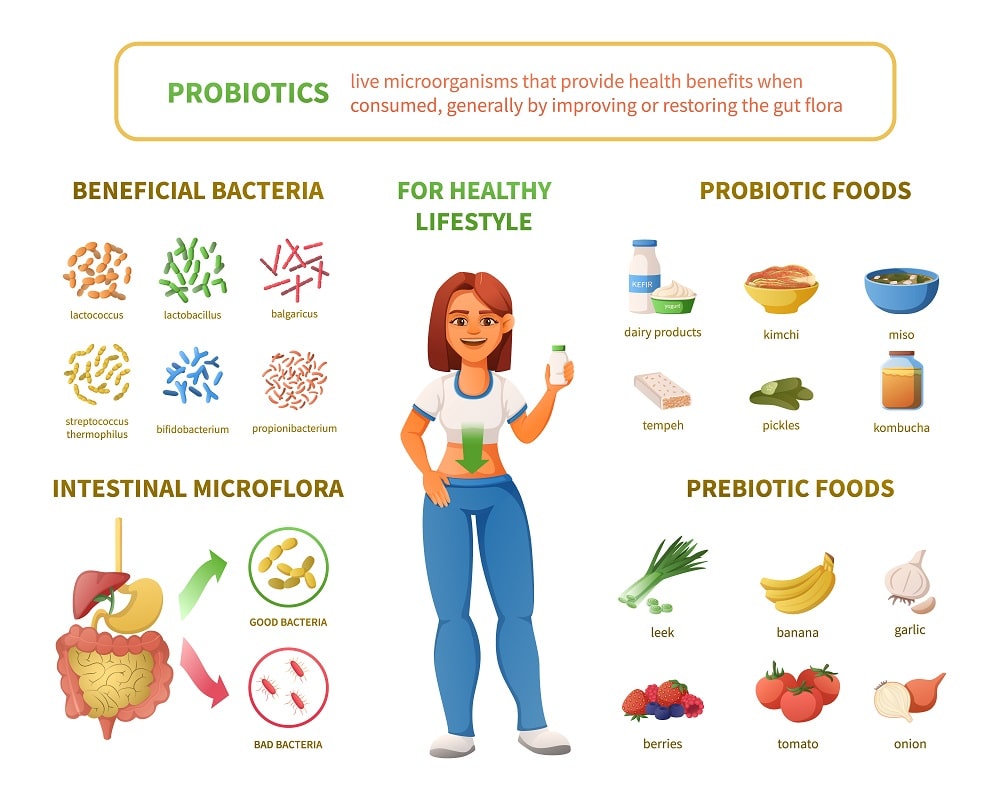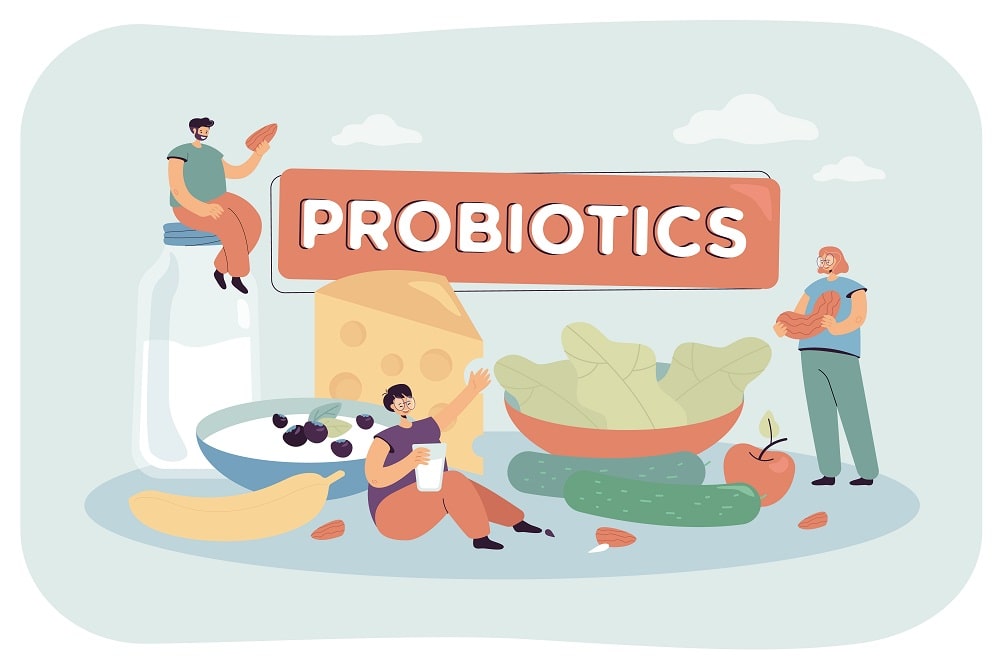Weight loss is an ongoing challenge that many people struggle to overcome. While a healthy diet and regular exercise are essential components of any weight loss plan, probiotics may also play an important role in helping you reach your goals. This guide provides an in-depth look at how probiotics can help with weight loss, including the best probiotic strains to consider, dietary sources of probiotics, and scientific evidence on their efficacy. Additionally, you will find tips for incorporating probiotics into your weight loss plan and advice for combining them with diet and exercise. Read on to learn more about the best probiotics for weight loss.
What is Probiotics?
Probiotics are live microorganisms that, when taken orally, can provide various health benefits. They act as beneficial bacteria in our gut and play an important role in digestion, nutrient absorption, and maintaining the balance between good and bad bacteria. They also help to protect against infection and may reduce inflammation. While the most common probiotic strains come from the Lactobacillus and Bifidobacterium genera, there are a variety of other beneficial probiotic species.
The Connection Between Probiotics and Weight Loss
Recent studies suggest that certain probiotic strains can aid in weight loss by promoting a healthy gut microbiome, reducing caloric intake, and increasing nutrient absorption. It is important to understand that probiotics alone are not a miracle weight loss solution; they should be used with a healthy diet and exercise program.
Read More: Is Corn Good for Weight Loss? Benefits, Recipes & Meal Ideas
How Probiotics Affect Weight Loss?
Gut Health and Weight
A healthy gut microbiome is essential for maintaining a healthy weight because it helps to regulate digestion, absorption of nutrients, and appetite hormones. An imbalance in the gut microbiota can lead to digestive issues such as bloating, constipation, and diarrhea, which can affect metabolism and energy levels. In addition, certain strains of probiotics have been found to reduce inflammation in the gut, which can promote better digestion and help prevent weight gain.
Probiotic Strains and Their Impact
Different probiotic strains have been found to have different effects on weight loss. For example, Lactobacillus gasseri has been shown to reduce body fat mass and waist circumference. While Bifidobacterium animalis has been found to improve satiety and reduce hunger. Other beneficial probiotic strains, such as Bifidobacterium longum, have been found to reduce body fat mass by increasing energy expenditure.
Mechanisms of Action
The mechanisms of action for how probiotics affect weight loss are still being studied, but it is believed that they enhance the gut microbiome by increasing beneficial bacteria, reduce appetite, and improve satiety through regulation of hormones like leptin and ghrelin; support metabolism by aiding in the digestion and absorption of nutrients; and reduce inflammation, which can lead to better overall health.
Read More: Healthy Carbs for Weight Loss: A Nutritional Guide
Identifying the Best Probiotic Strains


1) Lactobacillus species
Lactobacillus species are the most commonly used probiotic strains for weight loss. Lactobacillus gasseri, in particular, has been found to reduce body fat and waist circumference when taken regularly. Other beneficial Lactobacillus species include Lactobacillus acidophilus, which helps to support digestion and nutrient absorption.
2) Bifidobacterium species
Bifidobacterium species are also beneficial for weight loss, as they have been found to reduce hunger and improve satiety. Bifidobacterium animalis and Bifidobacterium longum have both been found to be effective in reducing body fat mass.
3) Other Beneficial Strains
Other probiotic strains that have shown potential for weight loss include:
- Saccharomyces boulardii, which helps to improve nutrient absorption.
- Bifidobacterium breve, which helps to reduce inflammation in the gut.
- Lactobacillus rhamnosus has been found to help reduce body fat.
4. Strain Selection Criteria
When choosing a probiotic supplement, it is important to look for strains that have been studied and found to be effective for weight loss. It is also important to ensure that the product contains high-quality ingredients, as some supplements may contain contaminants or fillers. Additionally, it is best to look for products with multiple strains of probiotics as this will provide the most benefit.
Read More: Best Oatmeal for Weight Loss: Everything You Need To Know
Dietary Sources of Probiotics
Fermented Foods
Fermented foods are a great source of probiotics and can be easily incorporated into your diet. Examples include yogurt, kefir, kimchi, sauerkraut, miso soup, tempeh, and kombucha. It is important to note that not all fermented foods contain probiotics; some are simply the result of fermentation. It is best to look for products labeled as containing “live and active cultures.”
Probiotic Supplements
Probiotic supplements are another option for incorporating probiotics into your diet. These can take in capsule or powder form and contain a single strain or multiple strains of probiotics. When selecting a supplement, it is important to look for products labeled as “live and active cultures” and to read the label carefully to ensure that you get the correct dosage.
Prebiotic Foods to Support Probiotic Growth
In addition to consuming probiotic-rich foods and supplements, it is important to consume prebiotic-rich foods to support the growth of beneficial bacteria in the gut. Prebiotics are food for the probiotics, and they help them thrive and flourish. Examples of prebiotic-rich foods include onions, garlic, asparagus, bananas, apples, oats, and flaxseed. Apples are particularly beneficial as they contain prebiotics like pectin, which help to promote the growth of good bacteria in the gut. Adding these foods to your diet can help support the growth of beneficial bacteria in the gut, which may lead to weight loss.
Read More: Are Pickles Good for Weight Loss? A Comprehensive Guide
Scientific Evidence Regarding Probiotics for Weight Loss
Overview
Although much is still to learn about the connection between probiotics and weight loss, scientific evidence suggests that certain strains can improve digestive health, reduce inflammation, and help manage appetite. In addition, studies have found that probiotic supplementation can lead to a reduction in body fat mass when combined with a healthy diet and exercise program.
Studies
One study published in Obesity evaluated the use of a multi-strain probiotic supplement in overweight women. The study found that daily supplementation with the probiotic for eight weeks significantly reduced body fat mass compared to the placebo group.
Another study published in Clinical Nutrition looked at the effects of Lactobacillus gasseri on weight loss and metabolic markers in participants who were overweight or obese. The study found that daily supplementation with the probiotic for 12 weeks significantly reduced waist circumference, body fat mass, and triglyceride levels.
The evidence suggests that probiotics can benefit weight loss when included as part of an overall healthy lifestyle. It is important to note that different strains may have varying effects on weight loss, so it is best to consult a healthcare professional before beginning any probiotic regimen.
Read More: 12 Best Fruits for Weight Loss: A Comprehensive Guide
Incorporating Probiotics into Your Weight Loss Plan
1) Diet and Exercise
Probiotics should use with a healthy diet and exercise program for the best results. Eating wholesome, unprocessed foods, such as fresh fruits and vegetables, whole grains, lean proteins, and healthy fats, can help to reduce inflammation and support weight loss. Additionally, regular physical activity is essential for maintaining weight loss and improving overall health.
2) Choosing the Right Probiotic Products
When selecting a probiotic supplement, looking for products backed by scientific evidence is important. Look for products that contain strains of probiotics that have been studied and found to be effective for weight loss, such as Lactobacillus acidophilus, Bifidobacterium species, Saccharomyces boulardii, Bifidobacterium breve, and Lactobacillus rhamnosus. Additionally, it is important to read the label carefully to ensure that the product contains no contaminants or fillers.
3) Dosage and Timing
It is important to follow the manufacturer’s recommended dosage and timing for probiotic supplements. Generally speaking, it is best to take probiotic supplements on an empty stomach to maximize absorption and ensure they reach the gut intact. Additionally, taking a probiotic supplement at least one hour before or after meals can help improve nutrient absorption.
4) Potential Side Effects and Precautions
Although probiotics are generally safe, there is the potential for side effects in some individuals. These may include bloating, gas, and diarrhea. Additionally, certain strains of probiotics have the potential to interact with medications or supplements. It is important to talk to a healthcare professional before beginning any probiotic regimen if you take medications or other dietary supplements.
Read More: Is Salmon Good for Weight Loss? Benefits, Connection & More
Conclusion
In conclusion, incorporating probiotics into your diet is a great way to support weight loss goals. Probiotic-rich foods and supplements effectively improve digestive health, reduce inflammation, and manage appetite. In addition to eating probiotic-rich foods or taking a supplement. It is important to eat a balanced diet and engage in regular physical activity for the best results. When selecting a probiotic supplement, it is important to look for products backed by scientific evidence and containing the right strains of bacteria. Lastly, follow the manufacturer’s dosage instructions and talk to your healthcare provider before beginning any probiotic regimen. Doing so can help you reap the benefits of probiotics and achieve long-term weight loss success.
FAQs
Q: How often should I take a probiotic supplement?
A: It is generally recommended to take probiotics 2-3 times per day, depending on the dosage instructions provided by the manufacturer. Additionally, it is best to take the supplement on an empty stomach to maximize absorption.

